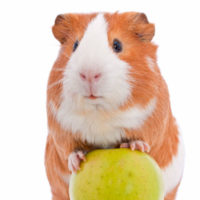Is your Guinea pig aged five or older? If so, you’ve got a tiny retiree on your hands! Most of these little furballs are considered seniors at five years old. Just like people, cavies tend to slow down and become a bit more fragile as they age. Your little pal will definitely appreciate some extra TLC. An Ellicott City, MD vet discusses senior Guinea pig care below.
Comfort
Small touches can go a long way towards keeping your adorable little pet comfy as he ages. Extra bedding and soft beds will help a lot. If your cavy has a multi-story cage, consider moving him into a smaller, single-level one. Or, if nothing else, adjust the ramps so the angle is gentler.
Sight
Senior Guinea pigs often experience the same types of vision problems as older people do, such as cataracts and trouble seeing at night. Avoid rearranging your pet’s cage, and keep a soft nightlight on after dark.
Food
You may notice that your pint-sized pal isn’t as interested in food as he used to be. Give him yummy, healthy treats can help stoke his appetite. Corn on the cob is a good option, though you don’t want to offer it daily. It’s also crucial to make sure your little buddy is getting enough Vitamin C. Ask your vet for more information.
Grooming
Keep your furry little friend clean! Baths can be quite stressful for cavies, so you may do better just wiping your pet down with a damp, clean cloth. While you’re doing this, keep an eye out for things like bumps, lesions, swelling, tenderness or heat. Make sure his fur is dry before you put him back in his cage!
Health
Watch for signs of illness, such as stiffness, lethargy, unusual posture or behavior, hair loss, reduced appetite, and/or changes in eating habits. Older cavies also sometimes develop dental issues. Some of the red flags to look for here include drooling, dribbling food, and preferring softer foods. Contact your vet if you notice anything amiss.
Water
Dehydration is a common issue with older pets. Your tiny furball should always have fresh, clean water. Make sure your fuzzy friend’s water bowl or bottle is in a spot that’s easy for them to reach.
Do you have questions or concerns about your pet’s health or care? Contact us, your Ellicott City, MD veterinary clinic, today!





